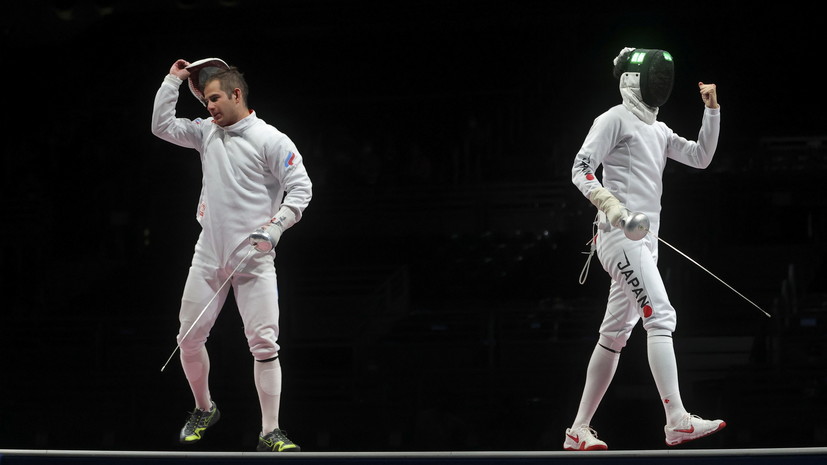Quarter-finals: no match without sensations
Russian fencers manage to consistently win medals at the Olympic Games in Tokyo almost every day when they go out on the track - they have already brought two gold, two silver and a bronze, despite the fact that there is still a team saber tournament in reserve. Their colleagues from the men's team have never dreamed of such successes. Neither in individual competitions, nor in the national teams, none of the Russians even reached the semifinals.
The chance to avoid the failure of 2008, when men never climbed the podium, presented themselves in a command sword. But this type was not considered a medal for the Russians. In individual competitions, Sergei Bida reached the quarterfinals and lost to future champion Romain Cannon from France, while Pavel Sukhov and Sergei Khodos lost in the very first matches. Such unsatisfactory results left the national team without sowing and complicated the path to medals. In the quarterfinals, they had to fight with a strong and ambitious Italian national team, made up of silver medalists at the Rio Olympics.
Sukhov and Marko Fickera spent their three minutes just one shot to each other.
The next two fights did not reveal the leader, and as a result the score became 8: 8.
It is interesting that already in the first round a meeting of the leaders of the two countries Bida and Andrea Santarelli took place, and the Russian won in one shot.
In the fifth round, a turning point was outlined when Fikuera brought Italy's advantage to three points, but Bida restored parity by inflicting ten punches from Enrico Garrozzo.
After his not very successful fight, Hodos did not return to the track - he was replaced by Nikita Glazkov in the meeting with Santarelli.
The coaching decision turned out to be very successful - the Russian missed only two injections, and he himself inflicted four.
After that, Sukhov and Bida brought matters to an early victory with a score of 45:34, which at the beginning seemed like something fantastic.
Russian epee fencers created a sensation, but they were not the only ones who surprised at the start of the tournament.
Japan, which started from the 1/8 finals, alternately defeated the USA and France.
Moreover, the latter, who did not know defeats in the last three Olympics, with a difference of only one injection.
South Korea knocked Switzerland out of the fight, and China prevailed over Ukraine.
As a result, all the teams seeded under the first numbers and all the winners of the last world championship took off.
Semifinal: Russia vs Asia
From that moment on, the Russian national team could be considered the main favorite, but it was necessary to confirm the status in the meeting with the Chinese epee fencers.
The first round ended rather unexpectedly.
Bida faced Lan Minghao and lost 2: 5.
Fortunately, Glazkov was able to reduce the gap to a minimum, and Sukhov even brought the team one point ahead.
Bida corrected himself in a duel with Wang Zijie.
In the three minutes allotted to him, he managed to inflict ten injections and create a reserve for his partners.
They continued to maintain the lead at the level of two or three points, but for the last rounds this was not enough.
Sukhov understood this perfectly, so he tried to get as many points as possible in the duel with Lan Minghao.
Bida for the last fight with Dong Chao came out with an advantage of five points and increased it to seven.
The Russian team reached the final of the Olympics for the first time since 1996.
With the same score 45:38 in the other semifinals, the Japanese national team defeated South Korea, in which the 2016 Olympic champion Park Sung Young fenced.
Thus, the hosts of the Games secured the first ever medal in the men's epee, but its dignity depended on the state in which the Russians would approach the decisive confrontation.
Final: Japan's historic success
The Japanese did not have a single world championship medalist.
But the Ukrainian coach Aleksandr Gorbachuk managed to gather them into such a strong team, with which the Russians experienced their first real difficulties.
Bida and Glazkov, following the results of their fights, let the hosts go by three points.
Sukhov, in a fight with Satoro Uyama, missed two quick injections that could not pass without a trace.
The Russian epee fencer still won his micro-duel, but with a difference of only one point.
Uyama had a hard time with Bide in the fifth round.
The Japanese immediately took the lead with a score of 5: 0, and, if the total score allowed, he would have finished the fight without giving a chance to answer.
The leader of the Russian team still did not leave the track without a fight, but he was able to reduce the gap only to two injections.
In total, the gap was already five points.
Sukhov desperately tried to save himself from defeat.
In his second and third fights, he emerged victorious, but not at all with the margin that the team needed so much.
Before the final battle between Bida and Koki Kano, the Japanese were leading with a score of 37:33.
In the individual tournament, the Russian took the upper hand over the opponent, but this time he did not work out.
The Japanese fenced with such inspiration that it was impossible to cope with it.
Bida only attacked twice without a double thrust, while Kano literally rushed to victory.
The first men's medal of Russian fencers in Tokyo turned out to be silver, and the Japanese won the first gold in this sport - as the hosts of the Olympics, they were fully entitled to this miracle.

